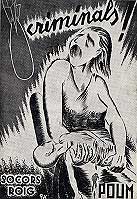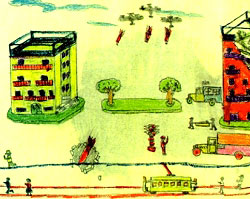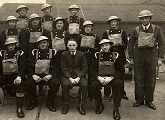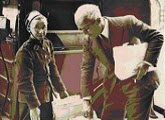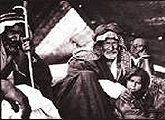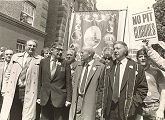The Spanish Civil War
Postcard, reference Coll Misc 0819, courtesy London School of Economics ; Air raid: reference NMLH.1997.24.2; reproduced by permission of People's History Museum These thumbnails are links to larger versions and more details.
Spain became a republic in 1931. In July 1936 there was a revolt by the Spanish military against the Popular Front government, a newly-elected coalition of Republicans, Socialists and Communists. General Francisco Franco became leader of this 'Nationalist' rebellion, which received substantial assistance from Nazi Germany and fascist Italy.
The British government (of Baldwin and Chamberlain) had agreed a policy of 'non-intervention' with other Western governments. But many anti-fascist volunteers joined the International Brigades - British socialists and communists, German and Italian refugees, and others from around the world - marshalled by the Comintern, the international organisation of the Communist Party.
The Basque region, with its own distinct language and culture, was a particular focus of Nationalist violence. Anarchists and the POUM (Partido Obrero de Unificación Marxista - Workers' Party of Marxist Unification) militia also opposed the Nationalists. POUM were Trotskyist, anti-Stalinist communists who were poorly equipped, and persecuted by the Spanish and Soviet Communists.
Franco's Nationalist forces were mainly professional soldiers and experienced mercenaries, aided by large numbers of German and Italian military.
By April 1939, all of Spain was under Nationalist control and Franco declared a victory. Over half a million people had been killed in the war, and in the next few years many tens of thousands more were executed as 'Reds'. General Franco's military regime remained in power until his death in 1975. Franco had already designated his successor, Prince Juan Carlos.
This month we highlight descriptions for the papers of political campaigners, historians, and International Brigades volunteers, the records of aid organisations, and descriptions for collections of posters, photographs, and interview material. There are also links to selected websites and suggested reading.
Collection descriptions
Campaigners and volunteers
- W. H. Auden (1907-1973): poet, playwright, librettist, critic, editor, translator; served as a stretcher-bearer for the Loyalists (supporters of the elected government). This collection consists of miscellaneous notes and correspondence.
- H. N. Brailsford (1873-1958): journalist and author; chaired the Labour Spain Committee, a pressure group; his opposition to POUM led him into conflict with the writer George Orwell (1903-1950) who had joined the POUM militia. This collection includes correspondence on the Spanish Civil War.
- E. J. Burford (1905-1997): in July 1936 Burford and his wife Nancy motored to Barcelona for the Workers' Olympiad and became stuck there when the military uprising broke out.
- Jimmy Deane (1921-2002): co-founder of the Liverpool branch of the Workers' International League; this collection includes publications relating to the Spanish Civil War.
- Hugo Dewar (1908-1980): founder member of the anti-Stalinist Communist League; this collection includes publications on the Spanish Civil War.
- Robert Edwards (1906-1990): Labour MP and trade unionist; led the ILP (Independent Labour Party) Contingent of POUM.
- Dai Francis (1911-1981): General Secretary of the National Union of Mineworkers and member of the Communist Party; this collection includes material relating to the Spanish Civil War, dating from 1937 to 1976.
- Ronald Fraser (born 1930): this is an oral history collection, from the late 1960s, which formed the basis for Fraser's book In Hiding: the Life of Manuel Cortes, 1970. Cortes (born 1905) was a socialist mayor, who survived thirty years in hiding from the Franco regime; this is a collection of audio recordings of interviews with Cortes and his family.
- Emma Goldman (1869-1940): anarchist; visited Spain in 1936 to observe the Spanish Civil War, and opened a Spanish anarchist propaganda office in London. She also joined with Fenner Brockway and others to establish the Committee to Aid Homeless Spanish Women and Children. This particular collection consists of correspondence and miscellaneous notes made by Goldman and her Welsh husband James Colton (1860-1936), an anarchist and trade unionist.
- Victor Gollancz (1893-1967): the publisher and writer Sir Victor Gollancz was a founder of the Left Book Club in 1936, which aimed to help in the struggle against fascism. Gollancz had published George Orwell's works up until Homage to Catalonia, but then Gollancz objected to Orwell joining POUM rather than joining the International Brigades. This collection includes personal papers relating to Gollancz's support of the Republican cause during the Spanish Civil War, including his involvement with British relief organisations; the collection also includes material relating to Gollancz's support for campaigns for democracy in Spain after the war.
- Walter Gregory (active 1936): fought in Spain as a member of the International Brigades.
- Jack Jones (1898-1965): colliery worker. In 1938 Jones volunteered for the British Battalion of the International Brigade, becoming the oldest Welshman in the Battalion. Jones was captured by fascist forces and kept in a concentration camp until 1939.
- Jack Jones (1913-2009): trade union leader, General Secretary of the Transport and General Workers' Union (TGWU) in 1969 until his retirement in 1978. Jones organised protest meetings in Liverpool against the British Union of Fascists, and fought against the fascists in Spain with the British Battalion of the 15th International Brigade; he was seriously wounded in 1938.
- Arthur Koestler (1905-1983): author and journalist, born in Budapest, Hungary; served as a war correspondent during the Spanish Civil War. Koestler was imprisoned and sentenced to death by the fascists, but released after pressure from the British government. He wrote Spanish Testament, 1937.
- Amos Mouls (active 1927): member of the Communist Party. This collection includes letters about the Spanish Civil War, and anti-fascist and Spanish Civil War leaflets by the Communist Party.
- Will Paynter (1903-1984): trade unionist; joined the British Battalion of the International Brigades as a 'political commissar' for the Communist Party.
- Edgar Allison Peers (1891-1952): professor of Hispanic Studies; author of The Spanish Tragedy, 1936, and Spain in Eclipse: 1937-1943, 1943. This collection includes lecture notes and correspondence relating to Basque nationalism and to the Spanish Civil War, with press cuttings, books, and 3,000 contemporary pamphlets.
- Tommy Picton (died 1938): Welsh coalminer who was killed in Spain when fighting for the International Brigades.
- Harry Pollitt (1890-1960): General Secretary of the Communist Party of Great Britain, 1929-1956; this collection includes papers on the Spanish Civil War, 1937-1938
- Eleanor Rathbone (1872-1946): Independent MP, associated with many campaigns of social reform; member of the National Joint Committee for Spanish Relief and the Honorary Secretary of the Parliamentary Committee on Refugees.
- J. S. Williams (1900-1938): Williams was involved in the recruiting and processing of volunteers in South Wales for the International Brigades. Williams joined the International Brigades in 1937.
Organisations
- Communist Party of Great Britain (CPGB): founded in 1920, based upon the philosophy of Karl Marx (1818-1883) and inspired by the Russian Revolution of 1917. The CPBG organised volunteers to fight for the Spanish government against fascism.
- For Intellectual Liberty: this association formed in 1936 as a rallying point among intellectuals for the defence of peace, liberty and culture. The collection includes papers from the physicist Professor Desmond Bernal (1901-1971), and includes committee correspondence from Independent MP Eleanor Rathbone (1872-1946), and authors Leonard Woolf (1880-1969) and Aldous Huxley (1894-1963).
- National Workers Sports Association : formed by Labour Party members and trade unionists to promote international unity and peace through sport; later became the British Workers' Sports Association. This collection includes some material on the beginning of the war in Barcelona. The Workers' Olympiad was due to be held in Barcelona in 1936 as an alternative to the Berlin Olympics. British athletes and supporters had already arrived in Barcelona when the fighting started and the Olympiad was abandoned. The collection also includes a scrap-book with press cuttings on the athletes' experiences, and various leaflets and fliers about meetings in support of the Republicans. This description is for the collection of George H. Elvin (1907-1964), who was secretary of the Cine-Technicians Union and General Secretary of the National Workers' Sports Association.
- North Stoneham Camp for Basque Children: established under the auspices of the Basque Children's Committee in 1937 to care for the children of Basque refugees from the Spanish Civil War. In 1937, almost 4,000 Basque children came to Britain as refugees. This collection was created by Eleanor Hickman, a volunteer at the North Stoneham Camp, near Southampton, and includes photographs, correspondence and ephemera.
- Socialist Medical Association: an organisation of socialist doctors, formed in 1930; the SMA sent a medical unit to Spain in 1936.
Ephemera and reminiscences
- Bateman Collection: Edith (1914-2003) and Donald Bateman (born 1920) collected works on Socialist and Communist history, the Spanish Civil War, and socialist politics in 20th Century Britain. This collection includes material relating to the Spanish Civil War and the Workers Party of Marxist Unification (POUM).
- Labour Party posters: collection of political posters, from 1938 onwards, including posters relating to the Spanish Civil War.
- Propaganda ephemera from the Spanish Civil War produced by the Spanish Republican Army, 1937; this collection includes printed posters.
- Recordings of Commemorative Events concerned with the South Wales Coalfield: this includes the unveiling of a plaque in 1976 commemorating those Welshmen who died serving with the International Brigades in the Spanish Civil War, and speeches in honour of the Welsh International Brigades
- Spanish Civil War:.this collection of videos includes interviews with a member of the International Brigade, a volunteer who helped run a Basque children's home and a member of the Spanish community in Wales. There are also documentaries about the war and video footage of photographs and posters relating to the war.
- Spanish Civil War collection: collection of 44 volumes of periodicals, news-sheets, official propaganda, and pictures, 1936-1939.
- Spanish Civil War Material: material collected by Swansea University; includes letters from International Brigades Commanders.
- Spanish Civil War Photographs: includes photographs of Spanish Civil War volunteers, memorials and ceremonies to commemorate those who fought.
- Spanish Civil War Postcards: postcards issued by POUM in Barcelona during the Spanish Civil War.
- Spanish Civil War Study: recorded interviews with Spanish Civil War veterans who went from the South Wales mining communities to fight against fascism in Spain. This is a collection of audio recordings from 1969-1970.
Suggested reading
Links are provided to records on Copac for these items. The Copac library catalogue gives free access to the merged online catalogues of major University, Specialist, and National Libraries in the UK and Ireland, including the British Library. For more information about accessing items see the FAQs on the Copac website.
- Blood of Spain: an Oral History of the Spanish Civil War by Ronald Fraser (1994) Records on Copac
- In Hiding: the Life of Manuel Cortes by Ronald Fraser (1972) Records on Copac
- Report of our visit to Spain, April 1937 by Katherine Atholl, Eleanor Rathbone and others (1937) Records on Copac
- "Spain 1937" and "September 1, 1939": poems by W.H. Auden in Another Time (2007, collection originally published in 1940; these poems are from 1937 and 1939) Records on Copac
- The Spanish Tragedy, 1930-1936: Dictatorship, Republic, Chaos by E. Allison Peers (1975, originally published 1936) Records on Copac
- Spanish Testament by Arthur Koestler (1937) Records on Copac
- Vision on Fire: Emma Goldman on the Spanish Revolution edited by David Porter (2006) Records on Copac
- British Volunteers in the Spanish Civil War: the British Batallion in the International Brigades, 1936-1939 by Richard Baxell (2004) Records on Copac
- Eleanor Rathbone and Her Work for Refugees (2004) by Susan Cohen (Ph.D. thesis) Records on Copac
- The Impact of the Spanish Civil War on Britain: war, loss and memory by Tom Buchanan (2007) Records on Copac
- Into the Heart of Fire: The British in the Spanish Civil War by James K. Hopkins (2000) Records on Copac
- Welsh Blockade Runners in the Spanish Civil War by P. M. Heaton (1985) Records on Copac
- The Battle for Spain: the Spanish Civil War 1936-1939 by Antony Beevor (2007) Records on Copac
- Homage to Catalonia by George Orwell (1999, originally published 1938) Records on Copac
- Spain, 1808-1939 by Raymond Carr (1975) Records on Copac
- Spain in Crisis: the evolution and decline of the Franco régime editor Paul Preston (1976) Records on Copac
- The Spanish Civil War by David Mitchell (1982) Records on Copac
- The Spanish Civil War: Origins, Course and Outcomes by Francisco J. Romero Salvadó (2005) Records on Copac
- The Spanish Civil War: Reaction, Revolution and Revenge by Paul Preston (2007) Records on Copac
- The Spanish Civil War (Studies in European History) by Andy Durgan (2007) Records on Copac
- The Spanish Republic at War by Helen Graham (2002) Records on Copac
Related links
-
Spanish Civil War:
an online guide to the many documents about the Spanish Civil War held at the Modern Records Centre, University of Warwick, which also has an online guide to archives at the MRC relating to British Trotskyism

- Peers Collection: the collections of Spanish lecturer E. Allison Peers (1891-1952) contain nearly 300 books and pamphlets contemporary with the Spanish Civil War, with press cuttings, lecture notes and correspondence, concerning Spain during the Civil War and its aftermath (University of Liverpool Special Collections & Archives)

- Spanish Civil War: the Working Class Movement Library holds an archive consisting of letters written by men from the Greater Manchester area who volunteered for the International Brigades (Working Class Movement Library, Salford)

- Magazines and War 1936-1939: Spanish Civil War print culture: online gallery of exhibition held at the Madrid Museum of Art in 2007

- The Spanish Civil War: Dreams + Nightmares: oral history project of the Sound Archives of the Imperial War Museum

-
Basque Children of '37 Association UK: in 1937 almost 4,000 children were evacuated from the Basque region to Southampton (registered charity)

- International Brigade Memorial Trust: formed in 2002 by veterans of the International Brigade and historians specialising in the Spanish Civil War.(registered charity)

- The Spanish Civil War: digitised documents in Welsh and English (National Library of Wales)
- Welsh Miners and the Spanish Civil War: a history of events, with images and audio recordings (Coalfield Web Materials website)
- Spanish Civil War: Sources at the Modern Records Centre: archive collections at the Modern Records Centre includes many documents about the Spanish Civil War; this includes an Image Gallery with Jack Jones: A Memorial (University of Warwick).
- The Spanish Civil War Collection: books, magazines, photos and ephemera (Glasgow Caledonian University)

- Imperial War Museum: Spanish Civil War Poster Collection: digitised versions of probably the largest public collection of posters from the Spanish Civil War in the UK, majority of the posters are Republican (VADS: the online resource for visual arts)

- National Library of Scotland: Papers of John Dunlop, 1937-1999. John Dunlop was a member of the International Brigade. Includes correspondence, articles and poetry relating to the Spanish Civil War.
With special thanks to Sue Donnelly, London School of Economics; James King and Liz Wood, Modern Records Centre; and Phil Dunn,
People's History Museum.
You can receive regular updates on our special features by joining our mailing list.


